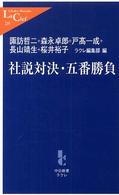- ホーム
- > 洋書
- > ドイツ書
- > Humanities, Arts & Music
- > Philosophy
- > antiquity
Description
(Text)
The reason/no-reason conceptual pair (also declinable in the similar forms of rational/a-rational, logical/a-logical) pervades the history of Western thought from the archaic era up to contemporary times. Perceived in different historical periods and in different cultural forms either as a conflict or as a vital coexistence, the reason/no-reason pair was first theorized and legitimated as a sharp contrast in antiquity with the Pythagorean systoichiai, and at the dawn of the twentieth century it was successfully exemplified by Nietzsche through the opposition between Apollonian and Dionysian principles, which denotes respectively the harmonious, orderly, 'bright' side of the human soul, and the chaotic one, wild, instinctive, passionate, 'dark'.
This volume is the outcome of the work of an international research group, which intended to cover some aspects of this dichotomy with the specific end to prove that the two sides of the human 'soul' don't contradict each other - in such a way that one excludes, ontologically and axiologically, the other - but they are rather closely interrelated and interdependent. Scholars with different expertise in the history of thought tackled diachronically some key moments of this story, from different angles and with different approaches, from ancient thought to modern neurosciences. The volume contains contributions of Krzysztof Brzechczyn (Institute of Philosophy, Adam Mickiewicz University), R. Loredana Cardullo (University of Catania), Francesco Coniglione (University of Catania), Santo Di Nuovo (University of Catania), Daniele Iozzia (University of Catania), Syliane Malinowski-Charles (Université du Québec à Trois Rivière), Concetto Martello (University of Catania), Alexandra Michalewski (Paris - Sorbonne, CNRS), Chiara Militello (University of Catania), Sebastian Moro Tornese (United Kingdom), Jean-Marc Narbonne (Laval Université, Canada), Anne Sheppard (Royal Holloway, University of London), Salvatore Vasta (University of Catania), Andrea Vella (University of Catania).
(Author portrait)
R. Loredana Cardullo is full professor of History of Ancient Philosophy at the University of Catania, Department of Education, of which she is currently Deputy Director. Her scientific interests mainly concern Aristotelian thought and Neoplatonism. Among her most recent publications: Asclepio di Tralle. Commentario al libro Alpha meizon (A) della Metafisica di Aristotele, Acireale-Roma, Bonanno 2012; Aristotele, Metafisica ? a ?, Roma. Introduzione, traduzione e commento, Carocci 2013; 'Sulla categoria aristotelica della sostanza. Variazioni esegetiche da Plotino ad Ammonio', Peitho. Examina Antiqua 1 (5) / 2014, pp. 59-89; Attualità di Aristotele? L'ilemorfismo alla base di alcune proposte morali contemporanee, in Percepire, apprendere, agire. I filosofi antichi di fronte al problema mente-corpo, a cura R.L. Cardullo e G.R. Giardina, Academia Verlag, Sankt Augustin 2017, pp. 57-81.Francesco Coniglione is full professor of History of Philosophy at the University of Catania. He has been president of the Italian Philosophical Society and is currently President of the Degree Course in Educational Sciences. In recent years, he has carried out a research on the knowledge society under the Seventh Framework Program of the EU (Through The Mirrors of Science, New Challenges for Knowledge-Based Societies, Ontos Verlag, Heusenstamm 2010). He has published volumes and papers on the history of European and Polish scientific philosophy and is currently pursuing a broad research on the intersection between scientific rationality and 'Rejected Knowledge'. Among his most recent works: 'Quale conoscenza per la 'Società della conoscenza'?', Bollettino della Società Filosofica Italiana, 2015; 'Galileo and Contemporary Epistemology. Do we still have something to learn from Galileo's 'methodological revolution'?', Przeglad Filozoficzny, 2016.






